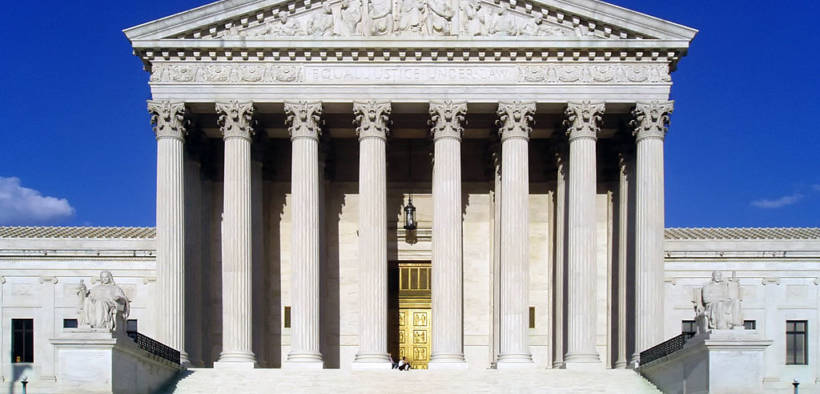Supreme Court Temporarily Upholds ‘Remain in Mexico’ Policy giving Trump Another Immigration Win

In another win for the Trump administration, the US Supreme Court granted an emergency request forcing asylum seekers to remain in Mexico.
In another win for the Trump administration, the US Supreme Court granted an emergency request forcing asylum seekers to remain in Mexico. President Donald Trump enacted the Migrant Protection Protocols (MPP), commonly referred to as the “Remain in Mexico” policy, in January 2019, but it was blocked in the 9th US Circuit Court of Appeals on Feb. 28, which then immediately issued a stay for the court order after the White House petitioned the Supreme Court.
Another Lower Court Ruling Overturned
The previous San Francisco-based appeals court ruling applied to cases within Arizona and California. The emergency petition approved by the Supreme Court was delivered just in time to stop it from going into effect on Thursday. However, although the policy was upheld, the order is only temporary as the court allows more time for the case to fully play out.
The order was also delivered unsigned with no justification, according to the New York Times.
Asylum seekers and groups representing immigrant rights have maintained that MMP violates both international and US law regarding refugees from Central and South America. Conditions in Mexico, they argue, are too harmful to knowingly subject refugees to while they await their asylum petitions.
An estimated 60,000 refugees live in tent camps along the US–Mexico border. In Mexico, in addition to the obvious low standard of living that comes with tent life, asylum seekers risk rape, murder, and human trafficking, lawyers argued against the administration’s emergency petition.
“Indeed,” an ACLU brief said, “the U.S. State Department itself has recognized the ‘victimization of migrants’ in Mexico ‘by criminal groups and in some cases by police, immigration officers and customs officials,’ including kidnappings, extortion and sexual violence.”
Health Concerns Rise
Now, refugees and groups assisting them worry about the potential spread of the Corvid-19 coronavirus. Although no cases have been reported yet, it is only a matter of time. The US has been unable to contain it even among its own residents and on Wednesday, Trump put a travel ban in place for 28 European nations.
Solicitor General Noel J. Francisco has already tried to justify MMP for health reasons.
“Processing a sudden influx of tens of thousands of migrants — each of whom would need to be screened, including for urgent medical issues — would impose an enormous burden on border authorities and undercut their ability to carry out other critical missions,” Francisco wrote, “such as protecting against national-security threats, detecting and confiscating illicit materials, and ensuring efficient trade and travel.”
Speeding Up the Process
In the US, the administration has ramped up efforts to expedite the asylum review process, but as a consequence, refugees have little time to prepare for their hearings. Once they are in Customs and Border Protection custody, they have a maximum of 90 minutes to contact attorneys and if they fail to answer, refugees are unable to leave call-back numbers, according to the Associated Press.
Sixty percent of the asylum seekers come from Honduras and Guatemala. The US has deported 800 people to the latter state since November, instructing them to apply for asylum there. However, conditions in their homeland often is too prohibitive as violence and poverty plague the state.
Refugees from El Salvador and Honduras are also currently sent to Guatemala since they traveled through it to get to the US border. Washington is working on an agreement with Honduras so it can begin sending migrants directly there as well.
Thanks to a new system, CBP can electronically check a person’s citizenship, skirting the typical two-week process normally required to obtain paper documents. Mark Morgan, CBP acting commissioner, said about 17,000 people have been processed using the “Electronic Nationality Verification” policy.
MMP does not apply to Mexican nationals or unaccompanied children, who are still subject to standard deportation and asylum procedures.
The policy, which CBP has the green light once again to enforce, came from negotiations between Washington and Mexico City to curb illegal immigration.
Sotomayor Speaks Out Again
Justice Sonia Sotomayor was the lone judge to comment publicly on the recent Supreme Court order, declaring that she would have chosen to deny the White House request. Sotomayor has become increasingly vocal about the administration’s requests for emergency hearings to block lower court rulings.
“Claiming one emergency after another, the government has recently sought stays in an unprecedented number of cases, demanding immediate attention and consuming limited court resources in each,” she wrote last month, dissenting from a ruling on green cards for immigrants. “And with each successive application, of course, its cries of urgency ring increasingly hollow.”
Trump called for her to recuse herself from future Trump-related cases citing political bias.
MMP essentially bars migrants from all Central and South American states from applying for asylum in the US as they passed through Mexico along their journeys. The Trump administration considers Mexico a safe state. However, on Wednesday, the same day as the Supreme Court order, the US Department of State released a human rights report citing “arbitrary killings, forced disappearance, and torture” by Mexican militants.



















